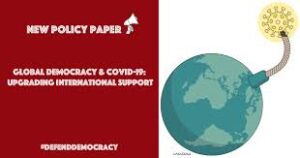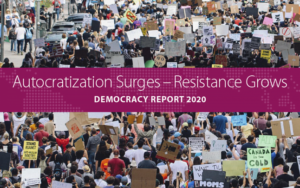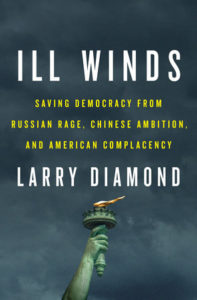 It is during a moment of democratic regression that opportunities for renewal and resilience become both evident and imperative.
It is during a moment of democratic regression that opportunities for renewal and resilience become both evident and imperative.
Around the world, COVID-19 has tested democracies and accelerated trends toward populism and authoritarianism, several analysts observe. In East Asia, however, things are playing out much differently. The region’s democracies have bucked global trends by handling COVID-19 capably and keeping their economies afloat – and, in the process, bolstering their public’s faith in democratic systems, they write for The Diplomat.
This is a season of Caesars and democratic discontent, argues Larry Diamond, a Senior Fellow at Stanford University’s Hoover Institution and Freeman Spogli Institute for International Studies. The problem is made worse by the ill winds that have blown against democracy everywhere in the world of late, he writes for Foreign Affairs, citing …..
….the pernicious influence of social media, which puts a premium on outrage and emotional engagement and hence has a natural affinity for disinformation; the multiple technological, economic, and environmental disruptions threatening people’s sense of self and security in what the journalist Thomas Friedman has called “the age of accelerations”; the rise of China and resurgence of Russia as authoritarian powers that see degrading and destabilizing democracy as an existential imperative; and the retreat from global responsibility of the country that in previous decades was the chief defender of embattled democracies—the United States.
 It has become customary to say democracy is now the only political belief system left standing – the ‘uniquely valued political system’ of our age – or at least the only one with credible universal pretensions. But the situation was not always thus. The world has seen numerous attempts to democratize that have slipped back some way, once, twice or more often, only to resume with greater energy, analysts Peter Burnell and Peter Calvert observed.
It has become customary to say democracy is now the only political belief system left standing – the ‘uniquely valued political system’ of our age – or at least the only one with credible universal pretensions. But the situation was not always thus. The world has seen numerous attempts to democratize that have slipped back some way, once, twice or more often, only to resume with greater energy, analysts Peter Burnell and Peter Calvert observed.
It is important to remember that the philosophical fascination with democracy is no mere transient thing, driven largely by contemporary events. The idea itself is quite ancient, they wrote for Democratization. So, it is entirely appropriate to begin by examining the resilience of democracy as vision, the question of how durable particular ideas of democracy have been in the face of intellectual resistance and opposition.
 The Gothenburg-based V-Dem Institute recently published its Democracy Report 2020, reporting that democracy is on the decline globally while autocratization is on the rise. For the first time since 2001, autocracies are in the majority with 92 countries comprising a total of 54 per cent of the global population.
The Gothenburg-based V-Dem Institute recently published its Democracy Report 2020, reporting that democracy is on the decline globally while autocratization is on the rise. For the first time since 2001, autocracies are in the majority with 92 countries comprising a total of 54 per cent of the global population.
As a nation’s resilience is chipped away in pieces big and small, even minor shocks can generate cascading effects, particularly during periods of uncertainty, notes Natalie Fiertz, who works on the Fund for Peace state fragility and resilience programs.
U.S. government responsibilities encompass what journalist and author Michael Lewis calls “the biggest portfolio of [catastrophic] risks ever managed by a single institution in the history of the world,” some now all too apparent while others still virtually unimaginable, she writes for The Hill.
A new nonpartisan initiative aims to address the “complete breakdown of people’s faith in democratic norms” that poses an “existential threat” to the political system. A bipartisan partnership to rebuild democratic resilience is taking shape in the Campaign for the Future of Democracy, reports suggest.
 The broad signs of political decay are familiar—and alarming—to comparative scholars of democracy, adds Diamond, the author of Ill Winds: Saving Democracy From Russian Rage, Chinese Ambition, and American Complacency, highlighting …
The broad signs of political decay are familiar—and alarming—to comparative scholars of democracy, adds Diamond, the author of Ill Winds: Saving Democracy From Russian Rage, Chinese Ambition, and American Complacency, highlighting …
....the growing polarization, distrust, and intolerance among supporters of the main opposing parties; the increasing tendency to view partisan attachments as a kind of tribal identity; the intertwining of partisan affiliations with racial, ethnic, or religious identities; and the inability to forge political compromises across partisan divides—and hence to mount effective policy responses to national issues. Scholars of democracy know where these trends have led in the past—to democratic breakdowns in interwar Europe and post–World War II Latin America and to the more recent rise of authoritarian populists in countries such as Venezuela and Turkey.







